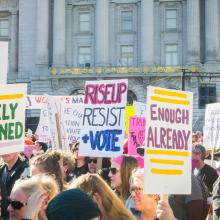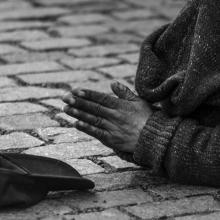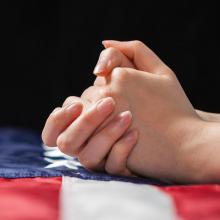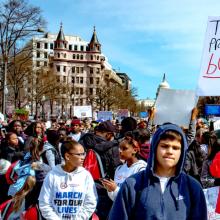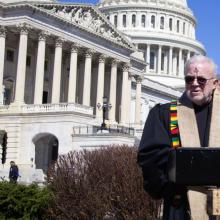Hearts & Minds
The revelations at the end of the summer from journalist Bob Woodward and from the anonymous administration official writing in The New York Times provided more evidence, as if more were needed, of the unhinged, immoral, chaotic, and deeply corrupt nature of the president and his administration. They also underscored the absolute necessity of creating and bolstering whatever checks and balances are possible to this administration’s power—not merely because of political exigency, which is dire enough to fairly name it as a constitutional crisis, but because the integrity of our faith is at stake as well.
While I’m convinced that the very soul of our nation is under threat by this administration and its actions, it’s not just policy or even character issues per se that have brought us to this point—as important as they are. Those issues include racial bigotry that overtly denies the image of God in all people; the denial and destruction of truth itself; a reversal of Jesus’ leadership values of service over domination; our unity in Christ as opposed to oppression based on race, gender, and class; whether we put “America first” or affirm the global character of our faith and relationships; and the real danger of growing autocracy and authoritarian rule over our democracy.
The moral corruption of this administration is staggering and presents increasing danger to the health of our society and the institutional balances of our republic. On top of all that, because of the Faustian bargain he has made with many white evangelicals, the Trump era has also created a defining moment for people of faith, not only a constitutional crisis but also a crisis of conscience. For Christians, that raises the stakes even beyond what they would be if this were “only” about a political catastrophe.

Marie Kanger Born / Shutterstock.com
THIS SUMMER, people were filled with righteous anger about the separation of children from their families at the southern U.S. border. The crisis sparked a critical mass of outrage about the Trump administration’s inhumane policy, especially when audio surfaced of separated children crying desperately for their parents. The press, a few members of Congress, and other elected leaders did heroic work in exposing the horrific human toll of these policies.
In the weeks the family separation policy was in place, more than 2,300 children were separated from their parents. Reuniting these children with their families will take months. Some of these children may never be reunited with parents—meaning they effectively have been made orphans by this administration’s combination of cruelty and ineptitude.
Make no mistake: This was not merely an accidental byproduct of a convoluted and broken immigration system that is long overdue for comprehensive, just, and compassionate reform. Family separation was the direct consequence of the Trump administration’s “zero tolerance” policy toward immigrants, some of whom were following the legal path of pursuing asylum. Administration officials argued that forcibly separating children from their parents was acceptable because it would be a “deterrent” to families seeking to enter the United States without proper authorization.
IN 2016, VOTERS faced extensive efforts to make voting more difficult, particularly for people of color and those who are poor. These efforts at voter suppression occurred as a result of GOP gains in governors’ races and state legislatures while Barack Obama was president—and also as a result of the Supreme Court gutting a key provision of the Voting Rights Act in 2013.
Between those two factors, 23 states—including some key battlegrounds in the presidential election—had new voter restrictions in place for the 2016 election. Examples include laws that eliminated polling places or moved them to less accessible locations, reduced polling hours, tightened voter-ID requirements, “purged” voter rolls, and reduced early voting and Sunday voting, which are popular among minority voters in certain regions.
As we approach the 2018 midterms, we need to protect the right to vote for citizens of all races, economic levels, and political persuasions. This is an imago dei issue: If we believe that all human beings are created in the image of God (Genesis 1:26), then efforts to prevent some of God’s children from exercising their franchise must be opposed as a matter of fidelity to our faith. It’s also a Matthew 25 issue: If we believe that how we treat people living in poverty and those who have been caught up in the system of mass incarceration is how we treat Christ himself, then we have a clear Christian mandate to ensure that society’s most vulnerable can exercise the right to vote.
In-person voter fraud is vanishingly rare, to the tune of only 31 documented cases out of 1 billion ballots cast between 2000 and 2014. To put it another way, the odds that any given person will attempt in-person voter fraud are something like 1 in 32 million, significantly lower than the odds of being struck by lightning. Twice.
THIS SPRING, more than 2,500 Southern Baptist women published a letter denouncing the misogyny and apparent toleration of domestic abuse exhibited by Paige Patterson, then head of Southwestern Baptist Theological Seminary and one of the Southern Baptist Convention’s most influential leaders.
These women are speaking truth to power at a critical time, affirming that “the Bible’s elevated view of womanhood,” as they put it, is completely incompatible with Patterson having counseled a woman who was being physically abused by her husband to keep quiet and pray for her husband, and with Patterson’s sexually objectifying comments about a 16-year-old girl. (In late May, Patterson was removed from his position as president of the seminary.)
The letter was a real risk for the signers in a religious world as conservative as the SBC, but it quickly opened up a needed conversation in the denomination and beyond.
We should be grateful for and inspired by the courageous witness of women in the church and broader society who are saying #MeToo and demanding accountability for predatory behavior and the pervasive sexism that creates an environment where sexual harassment and assault too often thrive. Too few men have demonstrated sufficient commitment to end domestic and sexual violence and dismantle the patriarchal system that undergirds them. Changes in both personal attitudes and structures are needed. Men in our churches, as in broader society, too seldom speak up on these issues.
A few years ago, Sojourners commissioned a poll of clergy across the country. We found that 65 percent of pastors speak once a year or less about sexual and domestic violence; 1 out of 10 pastors never address this topic. These distressing facts correlate with another of our findings: 74 percent of pastors underestimate how prevalent sexual and domestic violence is in their own congregations.
ON MAY 20, Christians around the world celebrate Pentecost, which commemorates the coming of the Holy Spirit to the earliest followers of Jesus on the 50th day following his resurrection on Easter Sunday. When I read Acts 2 and imagine the room filled with the small band of believers, a sound “like the rush of a violent wind” and tongues “as of fire” resting above each of their heads, my faith is excited, too.
While there were only 120 gathered in that room, 3,000 were added to their number that day. The power of Jesus, the identity of being a follower of Jesus Christ, and the catalyst of the Holy Spirit is such that in the years since, a tiny group of believers in 33 C.E. has blossomed to 2.2 billion who claim Jesus as Lord today.
Yet there have been times in the long history of Christianity when significant numbers of believers have gone astray, having lost the priorities of Jesus. Indeed, in some such times (the Crusades, the Inquisition, the colonization of Africa and the Americas, slavery, Jim Crow, anti-Semitism, and the Holocaust all painfully come to mind), people claiming the mantle of Christianity have committed terrible atrocities in the name of their faith.
THE RICHEST EIGHT people in the world, according to an Oxfam report this January, own more wealth between them than the poorest 50 percent of humanity—3.6 billion people.
Let’s make that clear: Eight people own more wealth than 3.6 billion people. That is simply grotesque. And it is the type of fact that needs to break through the complacency and routine of our daily lives, and the latest outrages of the U.S. president, and spur us to demand effective collective action to change course.
Many people don’t spend much time thinking about the difference between income inequality and wealth inequality, but it’s important to understand that wealth inequality is both harder to fix and harder to justify, and it has enormous consequences that resonate over multiple generations. The reality that the Oxfam report makes plain is that even while global extreme poverty has seen dramatic reductions over the last couple of decades, global wealth continues to be concentrated at the very top, into fewer and fewer hands.
The recovery of global financial markets since the crash of 2008 has been very good for the already wealthy, but for those who didn’t have many assets to begin with, the recovery of the stock market has benefited them far less. To put it bluntly, the class of the people who had the most to do with causing the crisis ended up benefiting the most from it.
MANY PEOPLE IN our nation, and indeed around the world, are frightened by the things happening in Washington, D.C. Those most affected by the actions of this administration are especially afraid—and so far the fears of those who were directly targeted by President Trump during the campaign have proven all too justified.
Immigrant families are faced with an administration crackdown on undocumented people. Children are afraid to go to school, families avoid medical facilities, and some people have even expressed their fear of going to church, where they might be targeted by Immigration and Customs Enforcement agents—whose numbers Trump and Homeland Security Secretary John Kelly have promised to increase by at least 10,000 as part of a deportation force.
In just one of many disturbing examples, in February ICE officials surrounded, questioned, and detained six Latino men who had just left the hypothermia shelter run by Rising Hope United Methodist Mission Church in Alexandria, Va. It is difficult to overstate the outrage and betrayal felt by so many that a church shelter for the homeless was targeted by the government to locate and detain undocumented immigrants. Amid these threats, people of faith are pledging to protect and defend undocumented immigrants under attack.
Many others are afraid too. Every black parent I know is afraid for their children, and that is a fact that white Christians, many of whom voted for Trump, must understand. Black pastors are concerned about the young people in their communities and their interactions with police. Racial policing is obviously not a new problem in America, and Trump didn’t start it, but the racial rhetoric of his campaign and the appointments he has made have struck fear into the hearts of many. The president promotes “law and order” and “stop and frisk” in familiar coded language that racial minorities understand. If there is no accountability from the administration or the Justice Department for those who would use excessive force against citizens of color—and especially young people—churches and clergy are pledging to hold their police departments accountable.
LIVING IN THE United States in the first months of Donald Trump’s presidency often feels surreal, disorienting, and overwhelming, including to some people in positions of considerable responsibility and influence.
There are, of course, many reasons for this, and those who regularly read my columns can no doubt list many of the things that most perturb and anger me about this administration. Many of us are focused on our solidarity and support for those who are most vulnerable in the face of the new political realities. We have lifted up the Matthew 25 Pledge movement aimed at protecting undocumented immigrants threatened with deportation, African Americans and other people of color threatened with racialized policing, and Muslims threatened with xenophobic hatred and discrimination.
But a unifying theme of all of Trump’s outrages and threats is his brazen assault on the very concept of truth and objective, knowable facts. Amid everything that’s going on, consuming and interpreting the news each day is considerably more exhausting than it should be because it has never been more difficult to sort fact from fiction. While this isn’t entirely Trump’s doing, his almost daily falsehoods have the large platform and weight of the presidency to prop them up and pound the American people with persistent and pervasive lying.
This spring, the news cycle was thrown into turmoil for more than a month by Trump’s evidence-free allegations that his predecessor, Barack Obama, had illegally wiretapped Trump Tower during the campaign. The president lied, accusing his predecessor of a serious crime with no justification or evidence. Rather than retracting it and apologizing, Trump has tasked his administration and the intelligence community with finding any shred of evidence to retroactively justify his lie.
ELECTIONS HAVE consequences. It’s a phrase we hear all the time, generally from whichever party won a recent election and is claiming a mandate to fulfill campaign promises.
Sometimes, for those observing Washington from the outside, the truth of this statement can get lost. People see partisan gridlock and say to themselves, “Nothing ever gets done in Washington. Both parties have all sorts of problems. Why should I even bother to vote?” Yet the truth is that all elections—local, state, national—matter. They all have consequences. And in 2017, we are seeing this play out in particularly dramatic and alarming ways.
There are countless examples, but I want to focus on the Department of Justice. While most employees there are career civil servants who stay in their positions regardless of who is president, new presidents get to fill many of the top positions with political appointees. Presidents can pick whoever they want to fill these posts (some must be confirmed by the U.S. Senate), and they can be fired by the president at any time, for any reason. FBI directors serve 10-year terms to insulate them from political pressure, but as we saw in May with James Comey, they can also be fired by the president at any time.
FOR MANY OF US, how people treat the Earth goes far deeper than “politics.” Our relationship with God’s creation is, at heart, a theological matter.
The Paris climate accord is not perfect—it does not go far enough and it is not binding. Nevertheless, it was a giant step forward to have 195 countries commit to curbing the carbon emissions that are endangering the planet and the people who live on it, especially the poorest and most vulnerable. That step was very important, the result of decades of hard work and diligent diplomacy.
Therefore, Donald Trump’s decision to withdraw the United States from the agreement is a theological failure and an abdication of American leadership on perhaps the most important crisis facing the world today. Politically, it was enormously shallow, arrogant, and truth-less: three words that sadly characterize many of the bombastic statements and decisions the administration has made.
PRAYER, FASTING, and advocacy are all spiritual disciplines—ones that we need right now. Several faith leaders came together this spring to call our brothers and sisters in our diverse faith communities to tie these three spiritual disciplines together “for such a time as this.”
What kind of time is this? We are living in a time when vulnerable people in the United States and around the world are facing tremendous threats from this administration and this Congress—threats that will be on vivid display in the budget debates that will consume Congress after Labor Day:

Darryl Brooks / Shutterstock
“WE CAN'T LET our status as nonprofits turn us into non-prophets.” My old friend Rev. Timothy McDonald III, senior pastor of First Iconium Baptist Church, said that at a town hall meeting on racism that we had in Atlanta’s Ebenezer Baptist Church last spring, on the anniversary of the murder of Martin Luther King Jr.
In McDonald’s “prophetic” way, he was pointing to a real dilemma that many of us as church leaders are having with this election. Namely, how do we speak to the clear Christian issues involved in this election without violating our status as a nonprofit organization? (Under IRS regulations, so-called 501(c)(3) organizations such as ours are prohibited from participating in political campaigns.) How do we raise up a morally independent stance, as opposed to a politically partisan position?
Sojourners has always sought to change the conversation of election debates by lifting up the voices and interests of those outside of traditional political discourse: the most vulnerable, who are often of least interest to those looking for votes or campaign contributions. We have never endorsed a candidate for president but have always raised the moral issues of poverty, peace, justice, and the dignity of every life during election campaigns and asked Christians to vote according to those values.
I spent three days in early September with three different groups of faith leaders who were trying to bring their faith to bear in this election. These meetings, which featured leaders from many faith traditions, ethnicities, and theological backgrounds, focused on how to respond to the divisive and dangerous racial rhetoric in this presidential election campaign. We sought to discern how to remain independent of partisan political causes, faithful to the transcendent Christian values that are clearly at stake in this election, respectful of Christians who are led to different voting preferences in every election (which is a healthy thing), and civil in our own public discourse in an election environment that seems to have lost all civility.
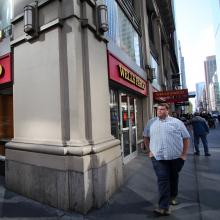
Northfoto / Shutterstock.com
I OPENED MY first savings account at Wells Fargo in Sacramento, Calif., when I was 8 years old. I remember the bronze stagecoach penny bank they gave me to help me practice saving. When I moved to Washington, D.C., I put my money into a D.C.-based bank, soon bought out by Wells Fargo. But it wasn’t the same Wells Fargo I’d grown up with.
In 2012, the Justice Department found Wells Fargo guilty of discriminating against both African-American and Latino borrowers during the subprime mortgage heist. It’s one of the top two banks invested in the Corrections Corporation of America, which is one of the largest for-profit prison companies in the U.S. In 2015, Wells Fargo was the world’s largest bank.
This fall, Wells Fargo CEO John Stumpf, who abruptly resigned in October, was called before a congressional investigative committee to answer accusations that thousands of Wells Fargo employees secretly opened 2 million fraudulent accounts without customers’ permission or knowledge, and were incentivized by the company to do so. Employees opened false banking and credit card accounts, transferred funds, and created phony access codes and email addresses. “The frauds violate federal and state statutes against bank fraud and identity theft,” William K. Black Jr., white-collar criminologist and cofounder of Bank Whistleblowers United, told Sojourners. Customers incurred charges and fines; in some cases, their credit ratings were damaged.
CEO Stumpf accepted “full responsibility for all unethical sales practices in our retail banking business.” (John Steinbeck once called this kind of thing a successful combination of “piracy and puritanism.”)
Wells Fargo claims that it has fired 5,300 people since 2011 related to these practices, but details are vague; the fraud investigators were hired by Wells Fargo. We don’t know how many were fired because they couldn’t fulfill the extortionate sales quotas.
AFTER A LONG and extraordinarily toxic election, white people elected Donald Trump president of the United States. They weren’t the only ones voting, but the white vote—coupled with efforts to suppress minority voters along with diminished enthusiasm and turnout among all voters—was enough to make the difference. After beginning his political career with a racist birther campaign against the first black president, then starting his presidential campaign with a speech that viciously denigrated Mexicans and immigrants, Donald Trump won the election not in spite of but because of his bigotry.
One of the important moral discussions that will take place over the coming months is around the questions “Who did evangelicals vote for in 2016, and why?” White evangelicals overwhelmingly supported Trump, but evangelicals of color did not. In light of these results, we need to step back and ask much-more-basic questions, such as “What is an evangelical?” “What do evangelicals look like?” and “What issues motivate evangelical voters?” The answers are more complicated and more encouraging than what the media and pollsters have traditionally described and what the votes of white evangelicals in this election painfully showed.
In 2016, the conversation about who evangelicals are and what issues motivate them began to change. An influential declaration signed by 80 racially diverse evangelical leaders focused on their rejection of the racial and gender bigotry of Trump. It clarified the fundamental differences between older white evangelicals and a new generation of multiethnic evangelical leaders and what they care about.
One sign of progress is that when the media discuss religious voting preferences, they are now more likely to use the phrase “white evangelicals” as a category rather than assuming that the term “evangelicals” applies only to white people.
THOSE BEARING witness at Standing Rock have become some of the most important, and most prophetic, leaders protecting God’s earth in America today—especially given the threat to our environment that Donald Trump represents.
There is no better example of what the struggle to protect God’s creation looks like now, and may look like in the future, than the “water protectors” at Standing Rock, who have put their bodies on the line for months to stop the Dakota Access pipeline from being built on sacred tribal lands and endangering the water supply of Indigenous people. Native Americans have been joined by people of every color and creed, including clergy (see “A Chorus of Resistance” in this issue) and military veterans, to prevent the construction from moving forward, despite brutal attacks from private security forces and state law enforcement.
The decision by the Army Corp of Engineers in early December to deny an easement for the pipeline route across Lake Oahe on the Missouri River, adjacent to the Standing Rock reservation, will temporarily halt the construction. But the head of the company building the pipeline has been a major contributor to Trump’s campaign, and with perhaps the most anti-environment president in memory about to enter office, the struggle is far from over.
“It is a temporary victory,” Denise McKay, a member of the Standing Rock Sioux told the Washington Post. “We’ve got to stay put and stay united.” Her daughter, Chelsea Summers, added, “everybody is still here for the long haul.”

Joseph Sohm / Shutterstock.com
PRESIDENT BARACK OBAMA has only been out of office for a few weeks, but his legacy is secure in ways that are critical to our national identity—and quite separate from his policy successes and failures.
One lens through which we can understand Obama’s relevance and lasting historical legacy is found, surprisingly, in the book of Genesis. Genesis 1:26-27 gives us the first biblical description of human origin: “Then God said, ‘Let us make humankind in our image, to be like us. ... Humankind was created as God’s reflection: in the divine image God created them; female and male, God made them.’”
This text is foundational to how we understand God’s purpose for the world and for human beings. Perhaps most important, it establishes the foundational value of every human as being made in the image of God ( imago dei).
This biblical revelation—and America’s racial history—is why the election of Barack Obama as president in 2008 is of such lasting importance. The United States was founded on the original sin of white supremacy, which declared that some people were less human than others; the nation was built on the kidnapping and enslavement of Africans and the displacement and eradication of Native Americans. In the process, the founders of our nation cast aside the notion of imago dei. The Constitution enshrined the notion that African slaves could be considered three-fifths of a person for the purposes of congressional representation (and Native Americans counted not at all).
Choosing an African-American man for the highest office in our nation—making him the most powerful person in the world for eight years—was and is a fundamental blow to white supremacy. The Obama presidency marked a historic era in the longstanding and ongoing movement to undo white supremacy and privilege.
DURING THE Easter season Christians commemorate the resurrection of Jesus Christ, after the devastation of Good Friday, when Christ was crucified. From darkness to light, from pain to healing, from despair to hope, from defeat to victory, from death to life. The resurrection of Jesus Christ is the foundation for our hope as Christians, even—and especially—when it’s hardest to have any hope, like at a time such as this.
I often quote Hebrews 11:1, which says, “Faith is the substance of things hoped for, the evidence of things not seen,” especially around Easter. I often paraphrase the text as, “Hope means believing in spite of the evidence, then watching the evidence change.”
It’s appropriate that, as Christians, we believe in a radical hope, a hope that often comes “in spite of the evidence.” Easter Sunday, which we just celebrated, is the perpetual reminder of the hope that comes when things seem most hopeless. We Christians say we are a resurrection people, and Easter Sunday both reminds us and dares us to prove it—that we are a people who can live our lives in hope, despite the evidence.
WHEN I RECENTLY spoke at Calvin College in Grand Rapids, Mich., on the subject of my book America’s Original Sin, the moderator introduced me with something that isn’t in my official bio. “Our speaker today has been arrested 22 times.”
It’s up to 23 times now, after I was arrested in December in the Hart Senate Office Building for reading biblical passages about poverty to protest the GOP tax plan, which disproportionately favors the rich.
In Shane Claiborne’s piece in this issue, he provides an overview of civil disobedience—both the biblical basis for disobeying unjust laws and how people doing so, often at great risk, have changed the course of history again and again. I want to share a few of my own reflections on civil disobedience.
In late 1983, on the heels of the Reagan administration’s invasion of Grenada, church leaders in Nicaragua called Sojourners and pleaded with us to help stop the invasion of their country, rightly fearing that the U.S. would target Nicaragua next. We asked ourselves, What can we do?
After much prayer and discernment, and in collaboration with many allies in the Christian peace movement, we launched “The Pledge of Resistance,” wherein Christians across the United States “pledged” to fill the offices of their members of Congress in massive civil disobedience if Nicaragua were invaded. Eighty thousand people eventually signed the pledge. Most of the signers were prepared to be arrested and go to jail if necessary.
Our hope in creating this pledge was to increase the domestic cost of a U.S. invasion—with a credible promise to mobilize tens of thousands to engage in principled law-breaking all over America—hoping that might make decision-makers reconsider. It worked.
I FEEL POLITICALLY homeless as we enter 2018, and I know I am not alone. Many are feeling the same, as other Christians, especially white evangelicals, have offered uncritical support for a president who is the antithesis of the gospel of Jesus Christ, endangering the witness and reputation of Christianity, especially among the younger generation.
Of course, the two political parties are not morally equivalent. But the Republican Party’s political sellout to Donald Trump and the Democrats’ lack of a clear moral alternative that many people of faith are excited to support leave many of us feeling politically homeless.
Republican leadership has sold its party’s soul to an amoral, childish, and dangerous man. He has been revealed as intellectually shallow, a person who lacks a moral conscience, and an unapologetic promoter of racial bigotry and misogyny. His disrespect for the rule of law and our political system of checks and balances can best be described as narcissistic and authoritarian paranoia, which creates a dangerous threat to American democracy and national security.
While some Republican commentators and elected officials have voiced opposition to the president’s behavior, the Republican Party has substituted a moral relationship to the presidency for a transactional one, in which they ignore Trump’s manifest unfitness for the office in exchange for enacting policies that support the greedy demands of their wealthiest donors. In doing so, the GOP has disregarded the espoused values of principled conservatism: fiscal integrity and responsibility, an allegiance to truth and honesty, genuine pro-family values, national security through global engagement, a commitment to opportunity for all and empathy for those in need, and the worth and equality of every person under the law.
DIETRICH BONHOEFFER was a young pastor and theologian in Germany during the rise of Adolf Hitler. Bonhoeffer founded an underground seminary, where he helped to lead what became known as the Confessing Church. His fundamental question was always, “Who is Jesus Christ for us today?”
There are never exact analogues in history. But there are questions and challenges from 1930s Germany that we should learn from today.
The Confessing Church and the Barmen Declaration, its statement of theological resistance to Nazism written mostly by theologian Karl Barth, were not simply expressing political opposition to Hitler and Nazism. Their objections were theological, and Hitler’s name was not even mentioned in the declaration. The issue for them was discipleship to Christ, as opposed to the uncritical support that many church leaders were offering to Hitler, creating in effect a “state church.”
